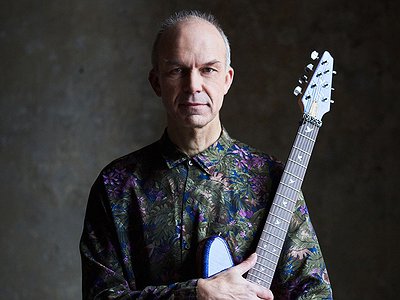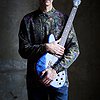Collaborations can take on many forms. What role do they play in your approach and what are your preferred ways of engaging with other creatives through, for example, file sharing, jamming or just talking about ideas?
When I was younger I liked to jam a lot ... Maybe because we didn't have any time limits and very often it was all just for fun. It's getting different now because nobody wants to lose his/her valuable time. In the beginning of the new project, it's much appreciated to have a general plan, talk, ideas, and try to visualize what's going to happen. This is mostly the first step. If this step is successful then the rest follows more naturally.
Could you take us through a day in your life, from a possible morning routine through to your work? Do you have a fixed schedule? How do music and other aspects of your life feed back into each other - do you separate them or instead try to make them blend seamlessly?
Most of the time I 'm working as a freelancer without a fixed schedule. But there are some routines which are easy and healthy to follow – morning exercise, some food, mailbox ... all these things belong to everyday life.
The schedule of the day is much related to the particular project and how much time you have left till the deadline. For composing I prefer to start earlier but for studio recordings I prefer some time in the evening and sometimes even nighttime. I used to take the occasional day off when I don't play/listen to any music. I like to work in a place where everything I need is available.
My wife is an artist as well and we work in our own society where freedom is very important. All our life is one big thing, we don't make artificial separations between different every-day tasks.
Could you describe your creative process on the basis of a piece or album that's particularly dear to you, please? Where did the ideas come from, how were they transformed in your mind, what did you start with and how do you refine these beginnings into the finished work of art?
My principle of work is being conscious. I know that better moments or days may never come if you don't start now. In an artist's life everything is important, every simple melody line or field recording or whatever. If you are awake, you will notice much more things around you than people normally do.
Working on my last album “Water Finds A Way”, I picked up sketches which I'd created years ago. These sketches were waiting for the “right” time. I also revisited my earlier compositions – “The Lake Freezes” from the last album was originally written for Girls Choir. The theme of “Hikers” was originally written for Theater play and so on. Working with an album is similar as writing a book. Everything is conceptual, the order of the tracks, the titles, even the length between the tracks.
There are many descriptions of the ideal state of mind for being creative. What is it like for you? What supports this ideal state of mind and what are distractions? Are there strategies to enter into this state more easily?
Listening to the music is obvious, it carries me emotionally to the next place which helps me start with my own ideas.The relaxation is fundamental. It will open everything. The question is how to get there? I believe that the keyword is altered state of consciousness. You have to get there and it takes time, sometimes less sometimes more. Once you are there you have to take as much from this as possible because it might be not possible next time. This is all very fragile. It really takes much power to keep your attention. For me there is one very simple process – start where you are and try to reach to the next level, then see what happens.
How is playing live and writing music in the studio connected? What do you achieve and draw from each experience personally? How do you see the relationship between improvisation and composition in this regard?
I have found that playing live and in the studio are totally different actions.
Playing / recording in the studio you are able to control a lot of things which are changing the whole picture of music. I can manipulate time, going there and back, making breaks or whatever. During a live performance I'm the servant of a particular place and time. Everything that happens, happens right there and nowhere else. And there is a big challenge for the metaphysical aspect – exchanging energy with the public. Perhaps the live situation is the home for an act of improvisation and the studio for an act for a composition.
How do you see the relationship between the 'sound' aspects of music and the 'composition' aspects? How do you work with sound and timbre to meet certain production ideas and in which way can certain sounds already take on compositional qualities?
It all depends on the root of music. I have reached the conclusion that sound/timbre oriented conceptual music is very close to the meaning of an environment, it's very emotional, close to the origin of nature.
In reverse, pure composition based music is more intellectual, it's easier to "measure" the process - to follow the chord changes, melodies and other traditional values. I prefer music where the sound conception and composition are in a good relationship, where emotional and intellectual worlds are both represented equally.
Our sense of hearing shares intriguing connections to other senses. From your experience, what are some of the most inspiring overlaps between different senses - and what do they tell us about the way our senses work? What happens to sound at its outermost borders?
I used to have a very sharp sense of hearing but I'm not sure is it always good for music. Especially when I'm turning down high frequencies of my guitar pickup – it's hard to imagine how it feels for others. It's a little similar with absolute pitch. It might be really disturbing to deal with a certain sound focused music where the pitch might be never “in the right place”.
Coming back to your question I remember one episode from one schoolparty from my childhood. The hall was totally overcrowded, without proper air ventilation. But the band was good and people were really into it. When I made a break and came back I realised that the air was absolutely horrible but nobody cared. Of course, alcohol and some other things had done their work but it was amazing how the sense of smell was adopted by the sense of hearing. Let's say in this situation the sense of hearing was stolen from the sense of smell ...
Another case. I'm organizing a series of performances at Tallinn Art Hall. These performances are taking place in the afternoon, 4PM. Once when I asked one young guitar player for the performance he refused. He said that people will “see too much” and they are not able to listen to his music. This may be true if the style of music is so vulnerable.
Art can be a purpose in its own right, but it can also directly feed back into everyday life, take on a social and political role and lead to more engagement. Can you describe your approach to art and being an artist?
Some artists are more social and more into politics, some are not. Certainly I'm not the type whose aim is to change the external qualities of the society. I have found my own way which I call a “modern healing music”. Some 7-8 years ago I started to receive more and more feedback from people who said my music has a healing effect. First I was a little shocked because I had never thought about this before. For me the real healing music belonged to the culture of the native people and to the different religious traditions. But if people really feel better after listening to my music then it may happen that it has an impact on the whole society. I believe that this circulation takes time but it works.
It is remarkable, in a way, that we have arrived in the 21st century with the basic concept of music still intact. Do you have a vision of music, an idea of what music could be beyond its current form?
I think that at the moment the music is mostly on standby. We have made rapid developments in the last 50 years and it feels that the changes have slowed down now. There are so many young people who are looking back in music history instead of looking forward.
Of course, looking back doesn't mean immediately copying or imitating old heroes. Maybe it's a kind of returning to the source and this can be really exciting.



